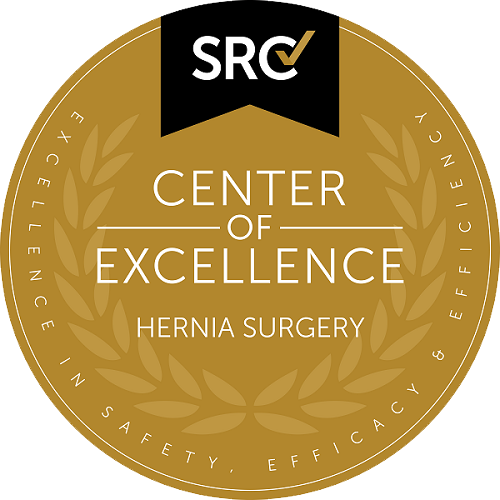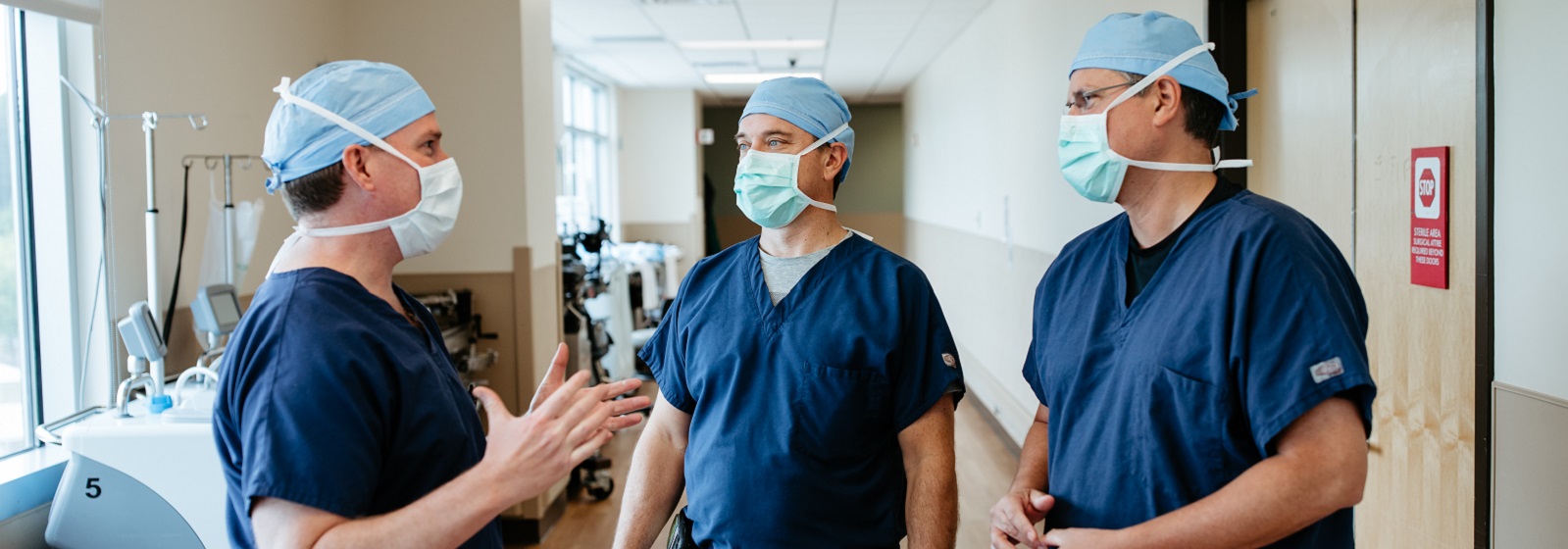
Georgia’s First Hernia Center of Excellence
Northeast Georgia Medical Center’s (NGMC) team of experienced hernia surgeons are among an elite group of surgeons nationally recognized by Surgical Review Corporation (SRC) for their commitment to improving the quality of care for patients who undergo hernia surgery.
As a part of NGMC’s robust Hernia Surgery Program, our surgeons have performed nearly 7,500 minimally invasive hernia repairs and more than 2,000 robotic hernia repairs using the da Vinci surgical system, helping your patients get back to their normal lives quicker with fewer complications.
With a high success rate, you can trust that your patient will receive the highest quality care possible when choosing NGMC for their hernia repair.
Why choose Northeast Georgia Medical Center as your partner in caring for your patients?
Early results from NGMC’s first 5 years of robotic hernia repairs show an 8% hernia recurrence rate, which is half the normal published recurrence rate of most laparoscopic and open hernia repairs of similar patients.
Related Reading:
Northeast Georgia Medical Center contracts with most managed care organizations. View the list of insurances we accept. In studies performed by colleagues across the nation, the cost of a robotic case compared to a laparoscopic case was less.
Northeast Georgia Medical Center is a participating institution in the Americas Hernia Society Quality Collaborative (AHSQC). This means we are dedicated to providing the highest quality care. Our team actively tracks recurrence rate and SSI and has a lower than the national average in both categories.
- Less than 1% of patients returned to the operating room
- Less than 1% of patients were readmitted to the hospital
- Less than 1% of patients had a subsequent hernia
- All inguinal hernias without complicating factors go back to work at one week on light duty (no lifting over 15 pounds) and full duty at 2 weeks after surgery without restriction
Quality is defined as a degree of excellence. To become a Center of Excellence, NGMC met or exceeded quality standards in the recurrence rate, the number of surgeries done, infection rate, and equipment (four da Vinci Xi 4th generation robots). We strive for excellence in all aspects of our Hernia Center.
The Hernia Center has standardized pre and post-op protocols to ensure the best chance for patients to be back to 100% full recovery.
- Most laparoscopic or robotic inguinal hernia patients are able to return to a modified (light) work routine within one week of surgery and back at full capacity without restrictions at two weeks.
- Most robotic ventral hernias patients can return to a modified (light) work routine two weeks after surgery and back to full activity without restrictions at six weeks.
The Hernia Center’s Chad Copper, MD co-authored a 2017 study showing a decrease in length of hospital stay of robotic incisional hernias vs. laparoscopic incisional hernias.
Meet Our Surgeons
NGMC offers patients three SRC-designated Surgeons of Excellence for hernia repair:
Dr. Chad Copper and Dr. Ron Lewis, participate in the Americas Hernia Society Quality Collaborative (AHSQC). The AHSQC is an elite nationwide group of surgeons sharing a unique commitment to improving the quality of care for patients who undergo hernia surgery.
Through the analysis of more than 59,000 hernia surgeries so far, the AHSQC provides best practices, decision support, care pathways and ongoing performance feedback to participants and partners. Tracking surgical cases since 2013, the collaborative group has grown to include more than 387 surgeons of varied experience.
Commonly Asked Questions
Yes. In a study published in the Annals of Surgery found that while watchful waiting is safe, symptoms will likely progress, and surgery will be necessary.
In a 2017 article in the Journal Robotic Surgery, results demonstrated that “robotic-assisted TAPP inguinal hernia repair appears to be a technically feasible, reproducible and safe minimally invasive alternative with low recurrence, low chronic pain and high health-related quality of life in the long term.”
Refer a Patient
To refer a patient to Northeast Georgia Health System, call 770-219-4040 or use the form on this page to connect with our referral coordinator.


